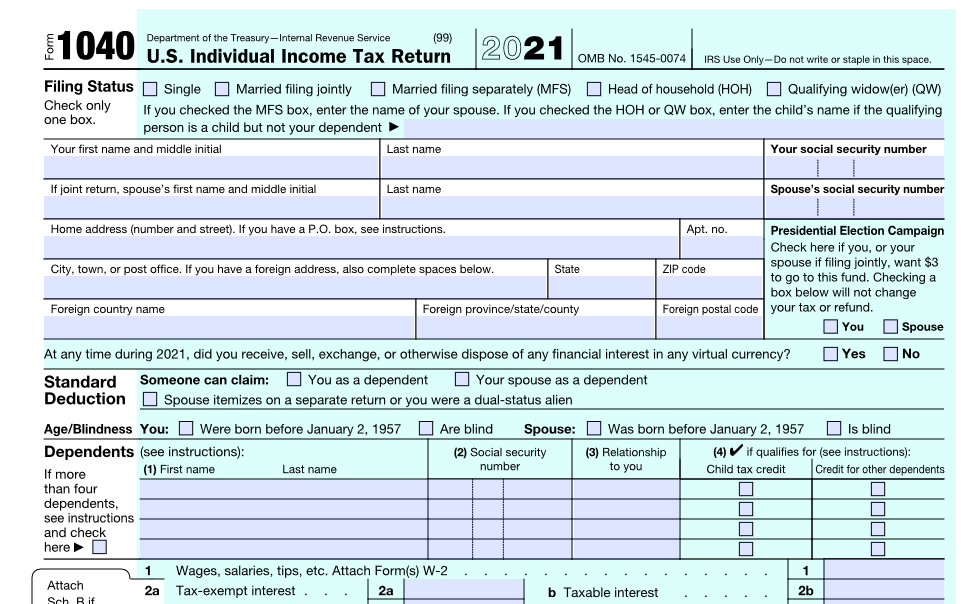The Internal Revenue Service is reminding reminded taxpayers living and working outside the United States that they must file their 2021 federal income tax return by Wednesday, June 15, 2022. This deadline applies to both U.S. citizens and resident aliens abroad, including those with dual citizenship.
Just as most taxpayers in the U.S. must timely file their returns with the IRS, those living and working in another country are also required to file. An automatic two-month deadline extension—until June 15—is normally granted for those overseas. Anyone who qualifies gets the extra time—they don’t need to ask for it.
File to claim benefits
A taxpayer must file, even if they qualify for tax benefits, such as the Foreign Earned Income Exclusion or the Foreign Tax Credit. These benefits are not automatic and are only available if a U.S. return is filed. This is true, even if these or other tax benefits substantially reduce or eliminate U.S. tax liability.
In addition, the IRS urges families to check out expanded tax benefits, such as the Child Tax Credit, Credit for Other Dependents, and Child and Dependent Care Expenses and claim them if they qualify. Though taxpayers abroad often qualify, the calculation of these credits differs, depending upon whether they lived in the U.S. for more than half of 2021. For more information, see the instructions to Schedule 8812 and the instructions to Form 2441.
Qualifying for the June 15 extension
A taxpayer qualifies for the special June 15 filing deadline if:
- Both their tax home and abode are outside the United States or Puerto Rico, or
- They are serving in the military outside the U.S. and Puerto Rico on the regular due date of their tax return.
Be sure to attach a statement to the return indicating which of these two situations applies.
Reporting required for foreign accounts and assets
Federal law requires U.S. citizens and resident aliens to report any worldwide income, including income from foreign trusts and foreign bank and securities accounts. In most cases, affected taxpayers need to complete and attach Schedule B to their tax return. Part III of Schedule B asks about the existence of foreign accounts, such as bank and securities accounts, and usually requires U.S. citizens to report the country in which each account is located.
In addition, certain taxpayers may also have to complete and attach to their return Form 8938, Statement of Foreign Financial Assets. Generally, U.S. citizens, resident aliens and certain nonresident aliens must report specified foreign financial assets on this form if the aggregate value of those assets exceeds certain thresholds. See the instructions for this form for details.
Treasury reporting requirement also applies to foreign accounts
A special reporting requirement applies to most people who have foreign bank or financial accounts. Often referred to as the FBAR requirement, it is separate from and in addition to any reporting required on either Schedule B or Form 8938.
The FBAR requirement applies to anyone with an interest in, or signature or other authority over foreign financial accounts whose aggregate value exceeded $10,000 at any time during 2021. They must file electronically with the Treasury Department a Financial Crimes Enforcement Network (FinCEN) Form 114, Report of Foreign Bank and Financial Accounts (FBAR). Because of this threshold, the IRS encourages taxpayers with foreign assets, even relatively small ones, to check if this filing requirement applies to them. The form is only available through the BSA E-filing System website.
Tied to the regular tax-filing due date, the deadline for filing the annual FBAR was generally April 18, 2022. But FinCEN is granting filers who missed the original deadline an automatic extension until Oct. 17, 2022. There is no need to request this extension.
Report in U.S. dollars
Any income received or deductible expenses paid in foreign currency must be reported on a U.S. tax return in U.S. dollars. Likewise, any tax payments must be made in U.S. dollars.
Both FINCEN Form 114 and IRS Form 8938 require the use of a Dec. 31 exchange rate for all transactions, regardless of the actual exchange rate on the date of the transaction. Generally, the IRS accepts any posted exchange rate that is used consistently. For more information on exchange rates, see Foreign Currency and Currency Exchange Rates.
Tax payments
To ensure tax payments are credited promptly, the IRS urges taxpayers to consider the speed and convenience of paying their U.S. tax obligation electronically. The fastest and easiest way to do that is via Online Account and IRS Direct Pay. These and other electronic payment options are available at Pay Online.
Expatriate reporting
Taxpayers who relinquished their U.S. citizenship or ceased to be lawful permanent residents of the United States during 2021 must file a dual-status alien tax return, and attach Form 8854, Initial and Annual Expatriation Statement. A copy of Form 8854 must also be filed with Internal Revenue Service, 3651 S IH35 MS 4301AUSC, Austin, TX 78741, by the due date of the tax return (including extensions). See the instructions for this form and Notice 2009-85PDF, Guidance for Expatriates Under Section 877A, for further details.
Extensions beyond June 15
Extra time is available for those who cannot meet the June 15 date. The IRS urges anyone needing the additional time to make their request electronically. Several electronic options are available. Visit IRS.gov/extensions for details.
Otherwise, individual taxpayers can request a filing extension to Oct. 17, by filing Form 4868, Application for Automatic Extension of Time To File U.S. Individual Income Tax Return. Businesses that need more time must file Form 7004, Application for Automatic Extension of Time To File Certain Business Income Tax, Information, and Other Returns.
Combat zone extension
Members of the military qualify for an additional extension of at least 180 days to file and pay taxes if either of the following situations applies:
- They serve in a combat zone or they have qualifying service outside of a combat zone, or
- They serve on deployment outside the United States away from their permanent duty station while participating in a contingency operation. This is a military operation that is designated by the Secretary of Defense or results in calling members of the uniformed services to active duty (or retains them on active duty) during a war or a national emergency declared by the President or Congress.
Deadlines are also extended for individuals serving in a combat zone or a contingency operation in support of the Armed Forces. This applies to Red Cross personnel, accredited correspondents and civilian personnel acting under the direction of the Armed Forces in support of those forces.
Spouses of individuals who served in a combat zone or contingency operation are generally entitled to the same deadline extensions with some exceptions. Extension details and more military tax information is available in IRS Publication 3, Armed Forces’ Tax Guide.
Visit IRS.gov for tax information
Tax help and filing information is available anytime on IRS.gov. The IRS website offers a variety of online tools to help taxpayers answer common tax questions. For example, taxpayers can search the Interactive Tax Assistant, Tax Topics and Frequently Asked Questions to get answers to common questions. IRS.gov/payments provides information on electronic payment options.
Thanks for reading CPA Practice Advisor!
Subscribe Already registered? Log In
Need more information? Read the FAQs
Tags: Benefits




